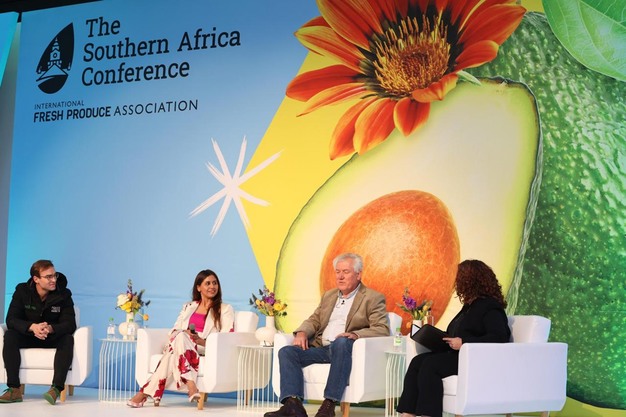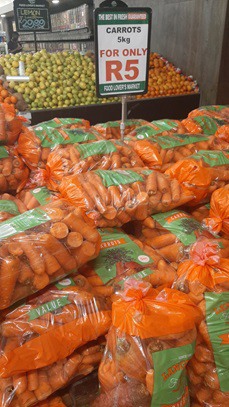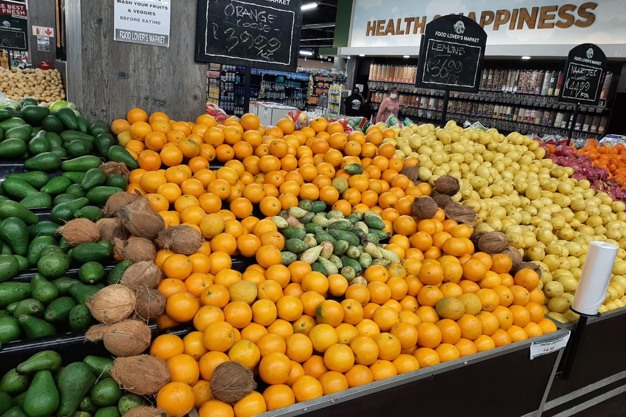The biggest operational problem facing retailers like Food Lover's Market, noted its retail division CEO Travis Coppin in a panel discussion at the International Fresh Produce Association's annual Southern Africa conference, had over the past few years doubtless been South Africa's erratic electricity supply. This has stabilised over the past few months, freeing South Africans from the relentless din of diesel generators for the moment. In fact, in his presentation earlier during the conference, political analyst Frans Cronjé had praised the cabinet minister responsible for electricity Kgosientsho Ramokgopa as "a very sensible minister".

Travis Coppin from Food Lover's Market, Shubha Rawal from IG International in India, Trevor Dukes, CEO of The Fruit Farm Group South Africa, in conversation with IFPA's
Miriam Wolk (photo: IFPA)
Keeping costs out of the stores
Now, after years of the state's fiscal profligacy and a post-Covid economic weakening, South African consumers are feeling huge pressure, and that, Coppin said, currently constitutes their major operational challenge. "We've had three years of inflation on almost every staple product we sell, other than fresh: the milk price, the egg price, the toilet paper price… The cost of energy in South Africa has probably gone up by 50% in three years if you're not running generators, and at the same time interest rates have gone by between 300 and 400 basis points. So you've got a consumer with less spending money on more expensive products."
They have witnessed a huge cost creep in business, he said. At all the buildings they own, they have installed solar electricity to reduce their dependence on the state-run national electricity grid. "Everything about us," Coppin remarked, "is keeping the costs out of the stores because, quite frankly, if it's not cheap they don't buy it. The month-end sales peak has reduced from fourteen days to perhaps five, and you can just see that there's no more money."
"Everything about us," Coppin remarked, "is keeping the costs out of the stores because, quite frankly, if it's not cheap they don't buy it. The month-end sales peak has reduced from fourteen days to perhaps five, and you can just see that there's no more money."
Right: "pile it high, watch it fly" (Food Lover's Market promotion during February 2022).
Food Lover's Market is, he added, one of those unusual retailers with a 25% fresh produce base, and it accounts for 10 to 12% of South Africa's fresh produce sales. Formal retail still accounts for 97% of fruit sales in South Africa.
Coppin observed that South African consumers will, probably, follow the worldwide move to demand more home deliveries, and he paid homage to the very successful Checkers Sixty60 home delivery service, leading in this race since Covid.
For the moment, though, in their experience, many still prefer visiting a store like Food Lover's Market for the actual shopping experience. "We have a crazy philosophy: 'pile it high, watch it fly'. When you go into our stores, you get a feeling of abundance, which you're getting at very few retailers."
Supply chain knock-on effects
The CEO of The Fruit Farm Group South Africa, Trevor Dukes, gave a neat example of the unintended effects arising from supply chain constraints which sometimes force grower-exporters like themselves into unfavourable positions. Despite enormously expensive European labour from a South African point of view, when their Pink Lady apples arrive in Europe, they are obliged to have the fruit repacked, "literally just to put a date code on it. We're unable to put on a date [at source] because we don't know when it's going to get there."
This gives away value in the chain, he says, and it adds cost for the consumer and further squeezes thin retail margins. "We're leaving money on the table which, hopefully, if you look at it piece by piece, you can avoid."
It's an age-old problem, Dukes noted, but one receiving renewed focus to keep price points where they are and move volumes.

Travis Coppin, Food Lover's Market: "I believe that consumers still want to be delighted when they go shopping."
Playing the long game
"I believe that consumers still want to be delighted when they go shopping," continued Coppin. "And for the younger generation, stories are big and vital to stay relevant: what you're doing for the community and for the environment. Our whole philosophy is that the store must support the community, whether it's a netball side or an orphanage – that's your job."
Dukes concurred, returning to a point he'd made earlier on the strengthening of partnerships. "Partnerships and sustainability are topics that are leading into the long-term future. It will add value for all stakeholders, not only for the resource, but also for the economic value and social value. Partnerships on the supply side as well as the receiving side are coming closer together, and that's a good thing."
As an aside, Dukes added his view that the industry was slightly overregulated by audits, "but the bottom line is we need to push each other so we can think differently besides just price, product and the market."
For more information:
Trevor Dukes
The Fruit Farm Group South Africa
https://www.thefruitfarmgroup.com
Travis Coppin
Food Lover's Market
https://foodloversmarket.co.za
